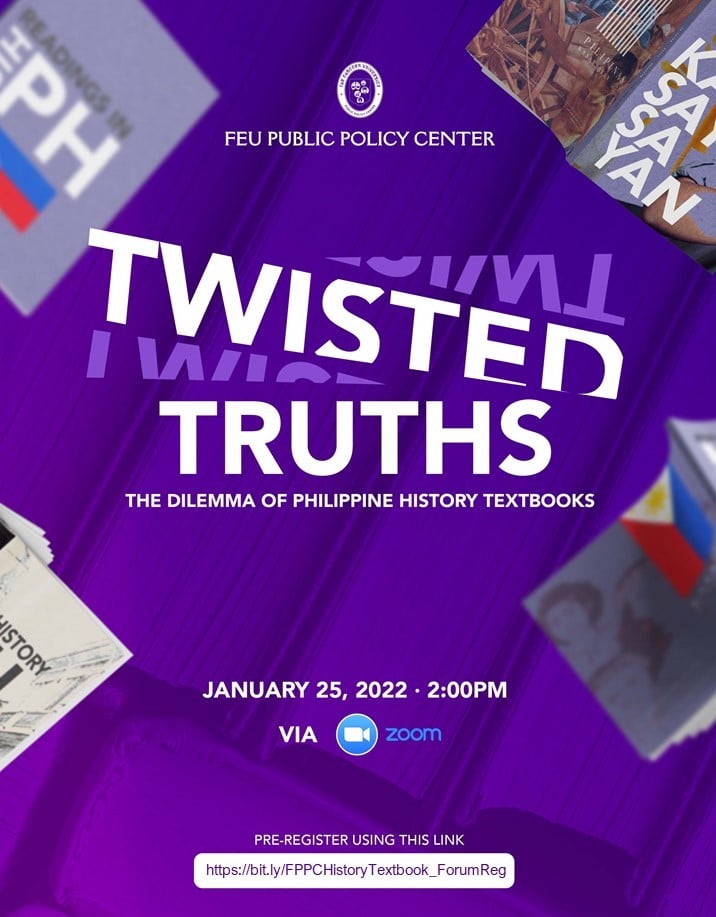Watch: https://youtu.be/nnh0u5S4_MA
The Far Eastern University Public Policy Center (FPPC) recently held an online forum that discussed their review of selected Grade 5 & 6 Araling Panlipunan textbooks. This review, which featured textbooks that are currently in use in FEU Cavite, FEU Diliman, FEU Roosevelt, Baliuag University, University of the East (UE), and Centro Escolar University (CEU), was led by former National Historical Commission of the Philippines Chairperson and FPPC Trustee, Professor Emeritus of History Dr. Maria Serena I. Diokno.
In his opening remarks, FEU President Dr. Michael Alba addressed that the root cause of the country’s education crisis may lie in how history is being taught to young Filipino students. “We thank them for their arduous work that they have undertaken which shines a light on a problem that has festered and has had many unintended consequences for Filipino society,” Alba added as he introduced the team of researchers.
Diokno was assisted by Dr. Kerby C. Alvarez, Dondy Pepito G. Ramos III, Francisco Jayme Paolo A. Guiang, and Aaron F. Viernes, all of whom are educators in the University of the Philippines (UP) Diliman Department of History. They divided their focus on four main components of the selected Araling Panlipunan textbooks — the foundation story and the main narrative of the Philippines, major inaccuracies, civic goals and values, and a note on Martial Law, including how these selected textbooks may or may not affect historical revisionism.
Foundation Story and Main Narrative
The basic narrative of the country’s struggle for freedom in the textbooks is found to be historically apt, but the linear approach it follows has a tendency to focus heavily on political events and
themes. Marking periods by conquest, war, or political administration provides a chronological anchor but limits the discussion on non-political topics like major disasters and history of diseases.
Factual Accuracy
The inaccuracies evident in the textbooks were categorized into seven different types — biases, debunked or outdated theories, factual errors, unfounded generalizations, mismatch between visuals and its caption, vague statements, and interpretations pretending to be objective. According to Guiang, the presence of many errors in textbooks should catch the attention of the educational community “because we’re problematizing revisionism in history and we can’t even get the basic facts straight in our textbooks.”
Expression of Civic-Mindedness
In Araling Panlipunan textbooks, civic mindedness is usually presented as end-of-chapter activities or prescriptions which state desired conduct and traits expected of a Filipino citizen. However, these activities and prescriptions do not really enrich the students’ civic education and its efficacy is almost impossible to measure. It is found that in the textbooks, civic mindedness often has greater appeal to emotion than to civic knowledge, a tendency to impose, and is not always relevant to the students.
Discussion on Martial Law
Only 6% to 11% of the total pages of the selected textbooks are focused on Martial Law, which, given its duration and the overall narrative of the country’s struggle for freedom, is considered very limited. Alongside excellent quality of explanation on the topic, poor quality that lacks critical information can also be found in one of the selected Araling Panlipunan textbooks. While there is a consensus among these textbooks that Martial Law is authoritarian in nature, it can be argued that some statements made can be considered as not credible or lacking substantial evidence.
Based on their findings, the team’s recommendations were as follows: 1) correct historical inaccuracies, 2) discuss neglected and silenced topics, 3) provide more data to support the authors’ interpretations, and 4) devote more space in the textbooks for the discussion of Martial Law.
For the full discussion and a more in-depth explanation, the ‘#TwistedTruths: The Dilemma of Philippine History Textbooks’ forum is available on the FPPC official Facebook page. Click here to view.
Visit FEU’s official Facebook page and website at www.feu.edu.ph for the university’s other initiatives.
Related articles:
Martial Law topic occupies ‘fairly limited’ space in textbooks — educator
